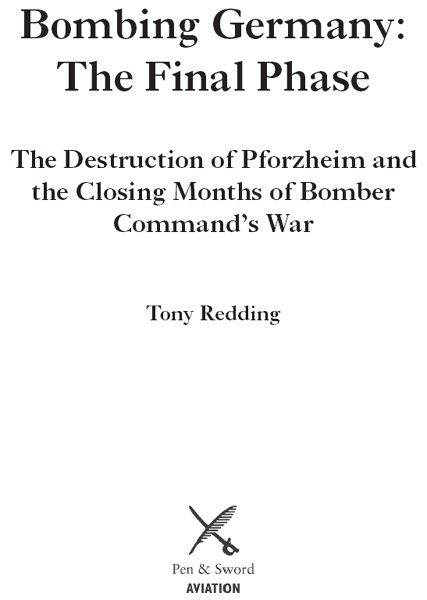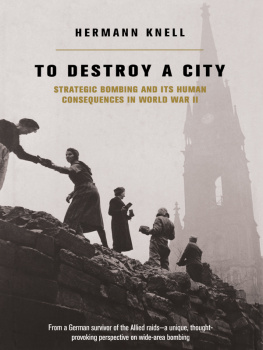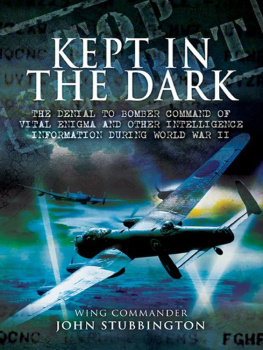To those with the will to resist

First published in Great Britain in 2015 by
Pen & Sword Aviation
an imprint of
Pen & Sword Books Ltd
47 Church Street
Barnsley
South Yorkshire
S70 2AS
Copyright Tony Redding 2015
ISBN: 978 1 47382 354 9
EPUB ISBN: 978 1 47385 046 0
PRC ISBN: 978 1 47385 053 8
The right of Tony Redding to be identified as the Author of this Work has
been asserted by him in accordance with the Copyright, Designs and Patents
Act 1988.
A CIP catalogue record for this book is available from the British Library
All rights reserved. No part of this book may be reproduced or transmitted
in any form or by any means, electronic or mechanical including
photocopying, recording or by any information storage and retrieval system,
without permission from the Publisher in writing.
Typeset in Ehrhardt by
Mac Style Ltd, Bridlington, East Yorkshire
Printed and bound in the UK by CPI Group (UK) Ltd,
Croydon, CRO 4YY
Pen & Sword Books Ltd incorporates the imprints of Pen & Sword
Archaeology, Atlas, Aviation, Battleground, Discovery, Family History,
History, Maritime, Military, Naval, Politics, Railways, Select, Transport,
True Crime, and Fiction, Frontline Books, Leo Cooper, Praetorian Press,
Seaforth Publishing and Wharncliffe.
For a complete list of Pen & Sword titles please contact
PEN & SWORD BOOKS LIMITED
47 Church Street, Barnsley, South Yorkshire, S70 2AS, England
E-mail:
Website: www.pen-and-sword.co.uk
Contents
Authors Note
B omber Command made a crucial contribution to the achievement of the Allied victory in Europe in May 1945. Its young volunteers fought a lonely war, each crew confined to the cramped fuselage of a heavy bomber.
Having written about the two operational tours of rear gunner Warrant Officer Sidney Knott, DFC (Flying for Freedom, more recently published as Life and Death in Bomber Command), I felt the need to tell the story from the other side, the people in the cities who endured the bombing.
This new project began when gunner Don Robson, during an interview for the earlier book, mentioned the murder of aircrew from his squadron at a place called Pforzheim. My original idea was to explore this war crime and tell the story of the victims and the perpetrators. Soon, however, the new books scope widened. I discovered that the Pforzheim raid killed over 17,000 people and was, in terms of deaths, the third worst raid on a German city, after Hamburg and Dresden. I was surprised that so little had been written about this cataclysmic raid on Pforzheim.
This book focuses on Pforzheims destruction and the time of the whirlwind the last seven months of the bombing war, when Germanys cities were finally overwhelmed. It includes the stories of the British aircrew, particularly the crews of 550 Squadron at North Killingholme, and tells the stories of those on the ground. Their accounts give a vivid impression of total war and the courage and resilience required to survive.
Tony Redding
Ash, Canterbury, 2014
Memories
O n Friday, 23 February 1945, Margot Geiger, a 16-year-old pupil at Pforzheims Hildagymnasium, went to work milling fuses at a watchmaking factory. Dawn came with a red sky, a strange herald of the citys fiery destruction later that day.
Margot had said goodbye to skilled watchmaker Werner Schultz, deported as a Mischling (half-Jew) for forced labour near Dresden. She had been used to taking messed-up fuses to Werner, who would try to salvage them while talking about things which were not to be discussed.
Eva Kulp was another friend. She had been ballet mistress at Pforzheims Stadttheater but had been conscripted for fuse work at the factory the previous September. Eva was not afraid to voice her opposition to the Nazis and showed no fear of denunciation.
At the end of the Friday shift, Margot parted from Eva at the corner of Heinrich-Wieland Allee and Bayernstrasse. Eva said she was going to a city pub. Suddenly, the pre-alarm sounded. Pforzheim was just minutes from destruction. Werner survived, thanks to the Nazis decision to deport him his train left the doomed city just two hours before the bombs fell. Margot survived the catastrophic raid, but Eva disappeared in the inferno.
Acknowledgements
T his book is the product of generosity, enthusiasm and support on the part of many people, both in Britain and in Germany. They include veterans of Bomber Command, who shared memories extending back to their youthful years when their lives were on the line. I owe a special debt of thanks to Wing Commander Jack Harris, OBE, DFC, who tolerated my persistent questioning and shared the results of years of research concerning his beloved 550 Squadron.
This project enjoyed much support in Germany. Dr Christian Groh, formerly director of Pforzheims Stadtarchiv, paved the way. He agreed to an initial interview, suggested contacts for further interviews, gave access to records and provided a base for research and other work. Leo Steinbeis organized and facilitated my visits to Pforzheim and assisted in the research. He also undertook translations and, when required, acted as interpreter during meetings and interviews. He was unswerving in his support and provided valuable advice and suggestions throughout. In the UK, Tony Butter and Tina Lindemann also made important contributions to the substantial task of translation.
I owe thanks to everyone in Britain and Germany who agreed to be interviewed. Some sources talked about very difficult and painful issues. Several local researchers and historians made outstanding contributions. Brigitte and Gerhard Brndle opened their extensive files on victims and resisters and, in doing so, provided insights into German society in the time of the National Socialists. Most importantly, they gave a human face to the victims of Nazi oppression and those with the courage to resist an appalling tyranny. Stephan Paetzold was equally generous in sharing his research into the murders of British airmen and, in particular, the killing of five members of RAF pilot Johnny Wynnes crew. Helmut Schmitt also gave an important overview of the context surrounding the murders following the bombing of Pforzheim.
A panel of readers corrected errors and provided much useful guidance during preparation of the text. They included Sidney Knott, Don Robson, Jack Harris, Jeremy Hayes, Dr Alan Russell, Brigitte and Gerhard Brndle, Stephan Paetzold and Dr Christian Groh. Naturally, the responsibility for remaining errors rests with the author.
This book represents a considerable workload and its completion is thanks in large measure to the extraordinary efforts of Joy Kemp, who did so much to prepare the text. Mandy Taylor, as always, also gave her time and support.
My thanks to all involved.
Tony Redding
Introduction
B ritain stared into a precipice in June 1940. France was lost. The British Expeditionary Force had been rescued but its heavy weapons remained at Dunkirk. Britain stood alone. There were the Navy and Fighter Command, but the battle for Britain to be contested by fighter squadrons during the Battle of Britain had yet to be fought. Invasion was expected and when Churchill became prime minister the national mood was caught by his chilling comment on the prospect of a landing: You can always take one with you!
The so-called Phoney War had ended in April 1940 with the German invasion of Denmark and Norway, followed soon after by the main offensive in the West. Until then, Bomber Commands aircraft were permitted only to sow mines, bomb German naval vessels when not in port (to avoid killing civilians) and engage in leaflet dropping. Now Germany showed the way in city bombing. With France defeated, Churchill faced immense pressures in ensuring Britains immediate survival, yet he still found space to look ahead. He sought a way to prosecute the war successfully in the longer term. On 8 July 1940, he sent Minister of Aircraft Production Lord Beaverbrook a perceptive memorandum: When I look round to see how we can win the war, I see that there is only one sure path. We have no continental army which can defeat German military power. The blockade is broken and Hitler has Asia and probably Africa to draw on. Should he be repulsed here or not try invasion, he will probably recoil eastwards and we will have nothing to stop him. But there is one sure way that will bring him back and bring him down and that is an absolutely devastating, exterminating attack by very heavy bombers against the Nazi homeland.
Next page












